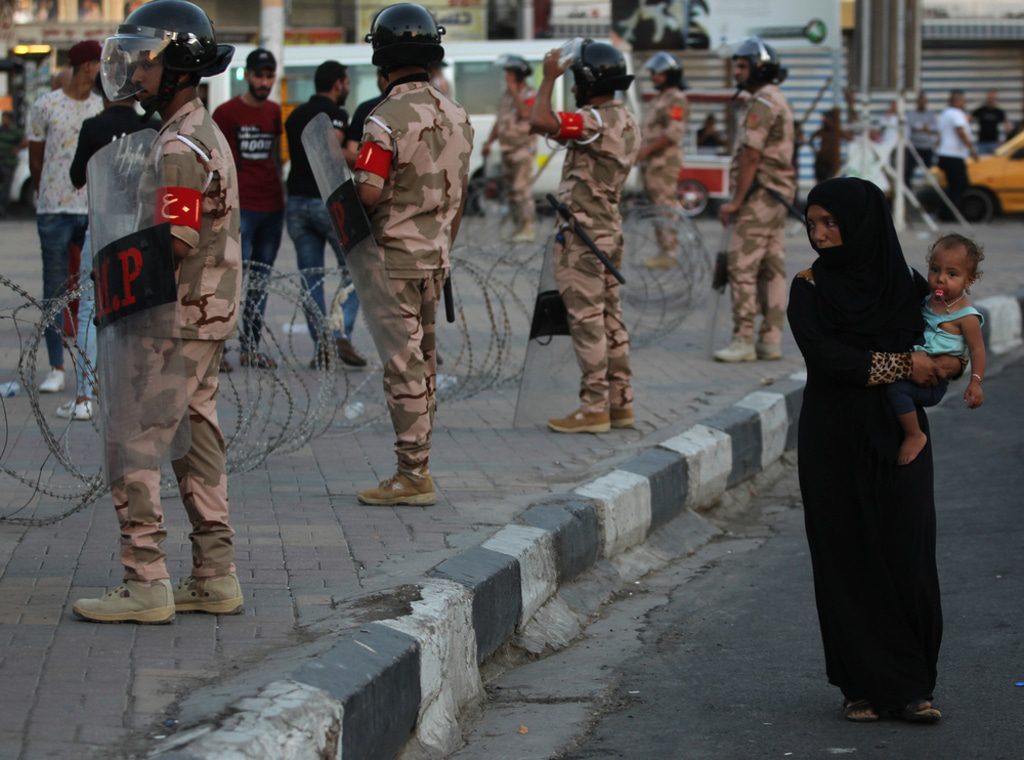Basra protests erupted on 8 July, when crowds gathered in Basra to protest the government’s failure to provide basic services.

Formation of a government in Iraq and the future stability of the country appear to be once again in doubt, as mass protests in July 2018 against rampant corruption and inadequate public services have swept the south of the country and beyond, resulting in a heavy-handed security crackdown and the death of protesters.
The unrest is founded in larger geopolitical factors: the first protests in Basra, a key hub of the oil industry, erupted after Iran stopped supplying electricity to the area, saying it was owed $1.5 billion in unpaid bills. Some political sources and analysts told al-Jazeera they believed the United States had put pressure on Iraqi officials not to pay up, as part of their escalating power struggle with Iran under President Donald Trump. This includes pulling out of the 2015 nuclear deal and re-imposing heavy sanctions on Iran.
But the protests have broadened beyond the issue of power cuts and to areas outside of Basra, including the capital Baghdad, channelling popular anger over a wide range of grievances against governmental and nongovernmental authorities.
By 21 July, at least 11 people had been killed by security forces, militia soldiers and unknown assailants in the demonstrations. Government officials have scrambled to promise improvements to public services in hopes of quelling the unrest, while coming under criticism for the security response. Protesters reported that security forces have repeatedly resorted to using gunfire to break up demonstrations, resulting in nonviolent demonstrators being wounded and killed.
In one video obtained by The Middle East Center for Reporting and Analysis, a man mourning a demonstrator who was killed asks, “Where was the army when [Islamic State] attacked us? Why didn’t the army fight them? They didn’t protect us, yet now they appear to kill us because we are asking for our basic rights in peace.”
Amnesty International has raised concerns that the Iraqi government is deliberately cutting off internet access to prevent protesters from sharing footage of excessive force by security forces. The human rights group said it had received reports of security forces using both tear gas and live ammunition against peaceful protesters in Basra.
The group also received a report of two protesters in Baghdad being dragged into a car and blindfolded by armed men in civilian clothes. The protestors were taken to an unknown location where they were allegedly ‘beaten, Tasered and interrogated about those who had organized the protests and asked if they belonged to extremist groups. They were later forced to sign papers without being told what they contained, and then released’.
For their part, protesters have set fire to the offices of political parties across the south and stormed government buildings and the Najaf airport.
The unrest and crackdown erupted on 8 July, when crowds gathered in Basra to protest the government’s failure to provide basic services such as electricity and clean water. The chronic power shortages have caused particular suffering during the summer months, when temperatures can reach 50 degrees Celsius.
Another issue is the high unemployment. This is a particularly sore issue in Basra, where the lucrative oil sector has been criticized for giving a majority of its jobs to foreign workers. The sector reportedly represents 89 per cent of the state budget and 99 per cent of the nation’s export revenues but only one per cent of jobs.
A committee representing the protesters laid out a list of demands at a press conference in Basra on 16 July, according to the Kurdish news site Rudaw. These included: developing a plan for solving water and electricity shortages with a clear timetable; discharging foreign workers and hiring Basra residents in the oilfields; improving health and education services; firing many of the local directors responsible for security and services in Basra; and a number of terms related to transparency about and allocation of petrodollars.
Prime Minister Haider al-Abadi has launched a public relations offensive, announcing plans to improve public services and economic conditions throughout the country, and particularly in Basra, where the cabinet said it would create 10,000 jobs. Al-Abadi has also tried to draw attention back to his government’s role in the successful fight against the Islamic State (IS).
In statement released by the prime minister’s media office, he said: “We have withstood and emerged victorious over terrorism and are building and providing services, construction and reconstruction. We must all cooperate with the federal and local government, clans, citizens, institutions and organizations to provide a service, because fights and conflict will not serve the citizen.”
In a separate statement, the prime minister said, “We have not fought [IS], a terrorist gang that occupied our cities and threatened all of Iraq, except to defend our people from harm and to provide a secure and stable life and decent services for all Iraqis.”
Meanwhile, the cleric Muqtada al-Sadr, whose political coalition pulled off a surprise win in May’s parliamentary elections, has aligned himself with the protesters. Via Twitter, al-Sadr called for talks to form a government to be suspended until the protestors’ “rightful demands” are met and for a “working cell” in the government to be created to coordinate with the demonstrators in implementing the demands. Likewise, Grand Ayatollah Ali al-Sistani urged authorities to address protesters’ grievances, while also calling on the protesters to remain peaceful.
The protests have targeted not only the political parties but Iran and its associated militias, which wield significant influence in Iraq. One protester was shot and killed in Basra by a security guard outside the office of the Badr Organization, a powerful, Iranian-backed paramilitary group.


